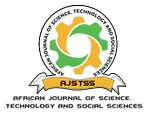Influence of performance expectancy on individual adoption levels of human resource analytics among human resource professionals in microfinance institutions in Kenya
DOI:
https://doi.org/10.58506/ajstss.v1i1.94Keywords:
MFIs, Adoption Levels, Human Resource Data, Human Resource Analytics, Performance Expectancy, CompetitivenessAbstract
Performance expectancy is when individuals believe an innovation supports their performance. Myriad challenges facing organizations have forced them to innovate to remain competitive. Human resource analytics is one such innovation which measures human resource functions for purposeful alignment with the organizations’ objectives. Earlier studies showed that 71% of respondents regarded human resource analytics as key. However, other studies found out that the uptake of human resource analytics was slow. The purpose of this study was to establish the influence of performance expectancy on individual adoption levels of human resource analytics among human resource professionals in Microfinance institutions in Kenya. The study was conducted in registered deposit taking Microfinance Institutions in Kenya. A cross-sectional survey was done on 500 human resource professionals. Stratified random and purposive sampling methods were used, obtaining a sample of 222 respondents. Questionnaires were used to collect data. The findings revealed that using human resource analytics improves job efficiency, making human resource professionals strategic. The study concludes there is a significant positive correlation (R = 0.754, p = 0.00) between performance expectancy and individual adoption levels of human resource analytics and that performance expectancy has positive significant effect on adoption levels (β = 0.855, p = 0.000). The study recommends that organizations align data analytical tools with management systems and also train its employees to increase the perceived usefulness of human resource analytics hence aiding with adoption.


